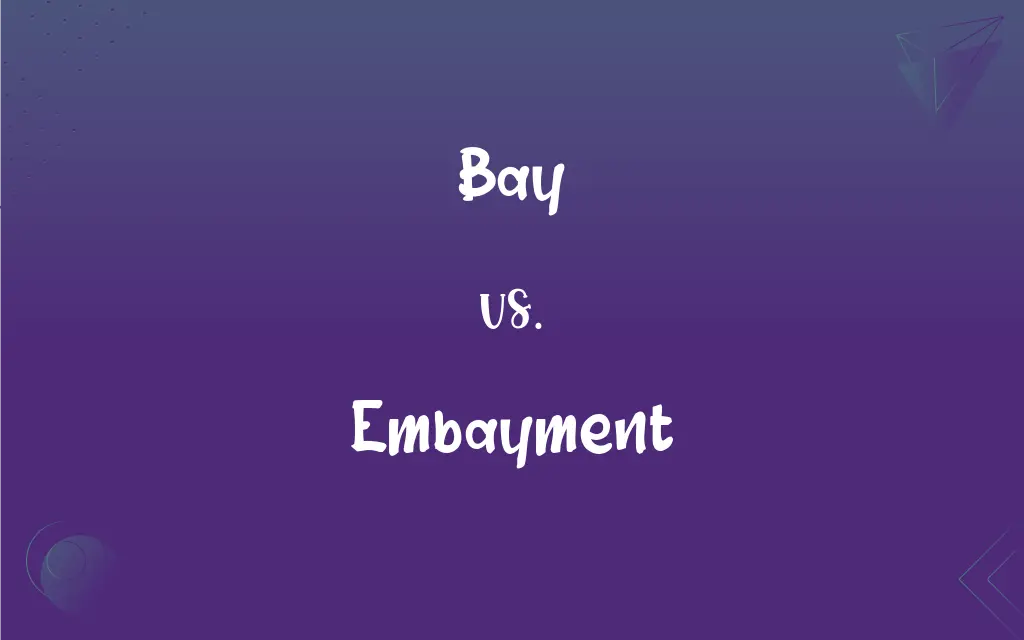Bay vs. Embayment: What's the Difference?
By Aimie Carlson & Harlon Moss || Updated on May 20, 2024
A bay is a broad coastal inlet where the land curves inward, whereas an embayment is a smaller or recessed part of a bay or coastline that forms an indentation.

Key Differences
A bay is a large body of water partially enclosed by land, offering a wide entrance to the sea. Bays are typically larger than coves and inlets and are significant geographic features that often serve as harbors or locations for major cities. An embayment, on the other hand, is a smaller indentation within a bay or along a coastline. It is often more recessed and sheltered than a bay, creating a more protected environment.
Bays are often named and recognized as significant geographic entities, such as the San Francisco Bay or the Bay of Bengal. These larger formations play crucial roles in shipping, transportation, and economic activities. Embayments are less prominent and are not always individually named but are critical in forming natural harbors and protected areas for marine species. Their smaller size compared to bays means they often escape broader recognition but are essential for local biodiversity and coastal protection.
Both bays and embayments are characterized by their partial enclosure by land, but a bay is generally larger and more open, whereas an embayment is smaller and more sheltered. The degree of protection from waves and currents also varies, with embayments typically offering more shelter.
While bays are often the sites of major ports and cities due to their size and navigability, embayments provide important ecological niches and serve as natural harbors and breeding grounds for marine life.
Comparison Chart
Definition
Large coastal inlet with broad entrance
Smaller indentation within a bay or coast
ADVERTISEMENT
Size
Generally larger and more expansive
Generally smaller and more recessed
Function
Harbors, major cities, navigation
Natural harbors, ecological niches
Examples
San Francisco Bay, Bay of Bengal
Smaller features within larger bays
Degree of Enclosure
Partially enclosed by land
More sheltered and protected
Bay and Embayment Definitions
Bay
A body of water partially enclosed by land.
The Bay of Bengal is one of the largest bays in the world.
ADVERTISEMENT
Embayment
An indentation forming a protected area.
Fish thrive in the embayment's calm waters.
Bay
An area of water providing a safe anchorage.
Ships anchored in the bay to avoid the storm.
Embayment
A natural harbor within a larger bay.
The embayment served as a safe refuge during the storm.
Bay
A large inlet along a coastline.
The bay's calm waters are perfect for sailing and water sports.
Embayment
A smaller recessed area within a bay or coastline.
The embayment provided a sheltered spot for the boats.
Bay
A body of water partially enclosed by land but with a wide mouth, affording access to the sea
The Bay of Biscay.
Embayment
A smaller coastal feature compared to a bay.
The embayment is ideal for studying marine ecosystems.
Bay
An area of land, such as an arm of prairie partially enclosed by woodland, that resembles in shape or formation a partially enclosed body of water.
Embayment
A secluded and sheltered part of a larger bay.
Kayakers explored the quiet embayment away from the busy bay.
Bay
(Architecture) A part of a building marked off by vertical elements, such as columns or pilasters
An arcade divided into ten bays.
Embayment
A bay or baylike shape.
Bay
A bay window.
Embayment
The formation of a bay.
Bay
An opening or recess in a wall.
Embayment
A bay. the water
Bay
A section or compartment, as in a service station, barn, or aircraft, that is set off for a specific purpose
A cargo bay.
An engine bay.
Embayment
The shoreline of a bay, an indentation in a shoreline. the land, not the water
Bay
A sickbay.
Embayment
A topographical feature that used to be a bay, like the Mississippi embayment.
Bay
(Computers) A drive bay.
Embayment
The process by which a bay is formed.
Bay
A reddish brown.
Embayment
A bay.
The embayment which is terminated by the land of North Berwick.
Bay
A reddish-brown animal, especially a horse having a black mane and tail.
Bay
A deep, prolonged bark, such as the sound made by hounds.
Bay
The position of one cornered by pursuers and forced to turn and fight at close quarters
The hunters brought their quarry to bay.
Bay
The position of having been checked or held at a distance
"He has seen the nuclear threat held at bay for 40 years" (Earl W. Foell).
Bay
See laurel.
Bay
Any of certain other trees or shrubs with aromatic foliage, such as the California laurel.
Bay
A crown or wreath made especially of the leaves and branches of the laurel and given as a sign of honor or victory.
Bay
Often bays Honor; renown.
Bay
Reddish-brown
A bay colt.
Bay
To utter a deep, prolonged bark.
Bay
To pursue or challenge with barking
"I had rather be a dog, and bay the moon" (Shakespeare).
Bay
To express by barking or howling
A mob baying its fury.
Bay
To bring to bay
"too big for the dogs which tried to bay it" (William Faulkner).
Bay
(obsolete) A berry.
Bay
, a tree or shrub of the family Lauraceae, having dark green leaves and berries.
Bay
Bay leaf, the leaf of this or certain other species of tree or shrub, used as a herb.
Bay
The leaves of this shrub, woven into a garland used to reward a champion or victor; hence, fame, victory.
Bay
A tract covered with bay trees.
Bay
A kind of mahogany obtained from Campeche in Mexico.
Bay
(geography) A body of water (especially the sea) more-or-less three-quarters surrounded by land.
Bay
A bank or dam to keep back water.
Bay
An opening in a wall, especially between two columns.
Bay
An internal recess; a compartment or area surrounded on three sides.
Bay
The distance between two supports in a vault or building with a pitched roof.
Bay
(nautical) Each of the spaces, port and starboard, between decks, forward of the bitts, in sailing warships.
Bay
(rail transport) A bay platform.
Bay
A bay window.
Bay
The excited howling of dogs when hunting or being attacked.
Bay
(by extension) The climactic confrontation between hunting-dogs and their prey.
Bay
(figuratively) A state of being obliged to face an antagonist or a difficulty, when escape has become impossible.
Bay
A brown colour/color of the coat of some horses.
Bay
A horse of this color.
Bay
(intransitive) To howl.
Bay
(transitive) To bark at; hence, to follow with barking; to bring or drive to bay.
To bay the bear
Bay
(transitive) To pursue noisily, like a pack of hounds.
Bay
Of a reddish-brown colour (especially of horses).
Bay
Reddish brown; of the color of a chestnut; - applied to the color of horses.
Bay
An inlet of the sea, usually smaller than a gulf, but of the same general character.
Bay
A small body of water set off from the main body; as a compartment containing water for a wheel; the portion of a canal just outside of the gates of a lock, etc.
Bay
A recess or indentation shaped like a bay.
Bay
A principal compartment of the walls, roof, or other part of a building, or of the whole building, as marked off by the buttresses, vaulting, mullions of a window, etc.; one of the main divisions of any structure, as the part of a bridge between two piers.
Bay
A compartment in a barn, for depositing hay, or grain in the stalks.
Bay
A kind of mahogany obtained from Campeachy Bay.
Bay
A berry, particularly of the laurel.
Bay
The laurel tree (Laurus nobilis). Hence, in the plural, an honorary garland or crown bestowed as a prize for victory or excellence, anciently made or consisting of branches of the laurel.
The patriot's honors and the poet's bays.
Bay
A tract covered with bay trees.
Bay
Deep-toned, prolonged barking.
Bay
A state of being obliged to face an antagonist or a difficulty, when escape has become impossible.
Embolden'd by despair, he stood at bay.
The most terrible evils are just kept at bay by incessant efforts.
Bay
A bank or dam to keep back water.
Bay
To bark, as a dog with a deep voice does, at his game.
The hounds at nearer distance hoarsely bayed.
Bay
To bark at; hence, to follow with barking; to bring or drive to bay; as, to bay the bear.
Bay
To bathe.
Bay
To dam, as water; - with up or back.
Bay
An indentation of a shoreline larger than a cove but smaller than a gulf
Bay
The sound of a hound on the scent
Bay
Small Mediterranean evergreen tree with small blackish berries and glossy aromatic leaves used for flavoring in cooking; also used by ancient Greeks to crown victors
Bay
A compartment on a ship between decks; often used as a hospital;
They put him in the sick bay
Bay
A compartment in an aircraft used for some specific purpose;
He opened the bomb bay
Bay
A small recess opening off a larger room
Bay
A horse of a moderate reddish-brown color
Bay
Utter in deep prolonged tones
Bay
Bark with prolonged noises, of dogs
Bay
(used of animals especially a horse) of a moderate reddish-brown color
Bay
A large coastal indentation with a wide opening to the sea.
The San Francisco Bay is a major harbor and economic hub.
Bay
A coastal feature forming a significant geographic entity.
The bay is known for its beautiful beaches and tourist attractions.
FAQs
How is a bay different from an embayment?
A bay is generally larger and more open, while an embayment is smaller and more sheltered.
Where are embayments typically found?
Embayments are found within larger bays or as smaller indentations along a coast.
Can an embayment serve as a natural harbor?
Yes, embayments often provide natural harbors and protected areas for marine life.
What is a bay?
A bay is a large coastal inlet with a broad entrance to the sea, partially enclosed by land.
Are embayments important for marine ecosystems?
Yes, embayments provide sheltered environments that are important for marine biodiversity.
Do bays host major cities?
Yes, many major cities are located along bays due to their navigability and economic advantages.
Are embayments typically named?
Embayments are often not individually named but are recognized as parts of larger geographic features.
Can bays be sites for tourism?
Yes, many bays are popular tourist destinations due to their natural beauty and recreational opportunities.
What is an embayment?
An embayment is a smaller, recessed area within a bay or along a coastline.
Where are bays typically found?
Bays are typically found along coastlines and can be significant geographic features, such as the San Francisco Bay.
What are some examples of famous bays?
Examples include the Bay of Bengal and the San Francisco Bay.
Can a bay be used for navigation?
Yes, bays often serve as harbors and are used for navigation and shipping.
Do embayments contribute to coastal protection?
Yes, embayments help protect coastlines by providing calm areas that reduce wave impact.
Do embayments have unique ecosystems?
Yes, embayments often have unique ecosystems due to their sheltered and protected environments.
Do both bays and embayments provide safe anchorage?
Yes, both bays and embayments provide safe anchorage, with embayments offering more sheltered protection.
How do bays impact local climate?
Bays can moderate local climate by influencing coastal weather patterns and providing sheltered waters.
What is the significance of bays in geography?
Bays are significant geographic features that influence coastal development, navigation, and ecosystems.
Are embayments suitable for recreational activities?
Yes, embayments are often ideal for activities like kayaking, fishing, and birdwatching.
Are bays larger than embayments?
Yes, bays are generally larger and more open than embayments.
Can embayments be found in all bays?
Embayments can be found in many, but not necessarily all, bays as smaller, recessed features.
About Author
Written by
Aimie CarlsonAimie Carlson, holding a master's degree in English literature, is a fervent English language enthusiast. She lends her writing talents to Difference Wiki, a prominent website that specializes in comparisons, offering readers insightful analyses that both captivate and inform.
Co-written by
Harlon MossHarlon is a seasoned quality moderator and accomplished content writer for Difference Wiki. An alumnus of the prestigious University of California, he earned his degree in Computer Science. Leveraging his academic background, Harlon brings a meticulous and informed perspective to his work, ensuring content accuracy and excellence.































































